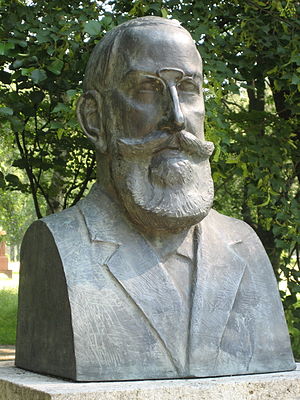- Maximilian Bircher-Benner
-
Maximilian Oskar Bircher-Benner (August 22, 1867, Aarau – January 24, 1939) was a Swiss physician and a pioneer in nutritional research. At his sanatorium in Zürich, a balanced diet of raw vegetables and fruit was used as a means to heal patients, contrary to the beliefs commonly held at the end of the 19th century.
He is best known for the invention of the muesli cereal, although his invention differs significantly from what is today known as muesli, and in Switzerland specifically as Bircher Müesli.
Bircher-Benner changed the eating habits of the late 19th century. Instead of much meat and white bread, he postulated eating fruit, vegetables and nuts. His ideas included not only controlled nutrition, but also spartan physical discipline. At his Zurich sanatorium off Bircher-Benner-Platz, the patients had to follow a somewhat monastic daily schedule including early bedtime (21:00), physical training and active gardening work. His theory of life was based on harmony between people and nature. Some of his ideas originate from observing the daily life of shepherds in the Swiss Alps, who lived a simple and healthy life.
In the late 20th century, after closure of the sanatorium, it was briefly a student hostel. It has since been purchased by Zurich Financial Services, and is named the Zurich Development Center. It is used for executive training, and also houses an extensive private art collection.
In parallel to Bircher-Benner in Europe, John Harvey Kellogg worked in the U.S. and followed another similar theory of the healthy diet.
External links

This biographical article related to medicine is a stub. You can help Wikipedia by expanding it.

